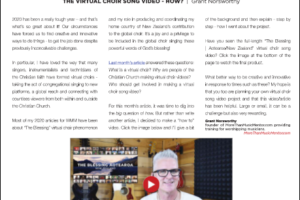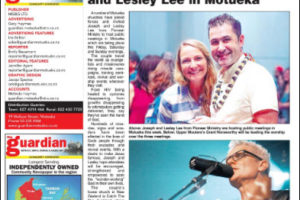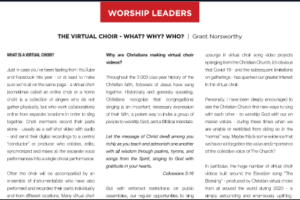Take this link to read Grant’s article as featured in the November issue of Worship…

WORSHIP – ON GOD’S TERMS, NOT OURS
By Grant Norsworthy
The English language is fascinating to me. Especially how particular words change in their meaning and usage over time, like:
Spam used to be a cold, canned meat. The word dab originally meant to gently press one thing against another. Now it’s a dance move!
My earliest recollection of the word awesome being used to mean “I really like this” was from actor Keanu Reeves in the 1989 movie Bill and Ted’s Excellent Adventure. That may have started the dismantling of the word awesome until, today, anything even slightly appealing can be awesome. Or, to quote the theme song from The Lego Movie, “Everything is Awesome!”.
But awesome used to be a word reserved to describe something that overwhelmed me with awe and wonder, even fear. The deeper, richer, more powerful meaning has been lost.
Awesome used to be a word reserved to describe something that overwhelmed me with awe and wonder
When Rich Mullins sang, “Our God is an awesome God!” I am sure he meant it with the original meaning of the word awesome in mind, and definitely not the current-day meaning.
As the meaning of once powerful and rich words diminish, I wonder what priorities are shifting and what truth is being lost to us.
“Changes in language often reflect the changing values of a culture.”
– Ravi Zacharias (Christian apologist)“The flood of careless, unconsidered, cheap words is the greatest enemy of the profound word.”
– Stephen L. Talbott
But it’s not just experts that tell us word usage is important. The Bible does too!
In Matthew 12:36-37 , Jesus tells us that, at our final judgment, we’ll each have to, “give account … for every careless word,” we have spoken, and that it’s by our words that we will be judged. Just a few chapters later, Jesus is recorded in Matthew 15:11 telling His followers that it’s not what we eat, but what we say that defiles us.
And then there’s this lesser-known verse:
“If anyone considers himself religious and yet does not keep a tight rein on his tongue, he deceives himself, and his religion is worthless.”
– James 1:26
This is a lesser-known verse today, I believe, because of the problem we have with the words religious and religion. Over the passage of time, the word religion – like the word awesome – has dramatically changed in its meaning and usage.
Once it was a good thing to think of one’s self as being a religious person. But today the word religious is usually used as a negative or even derogatory term. It might describe someone who thinks of themselves as morally superior to others, or someone who methodically, repeatedly does certain things in an effort to earn acceptability to their god.
Christians today do not easily see themselves as being religious, and so we do not resonate with the verse as deeply as we could, or should. A great deal of the original meaning of James 1:26 has been lost.
So, in an effort to bring back some of the lost meaning, let’s look at the original Greek word that has been translated as religious and religion in the most common English translations of James 1:26:
θρησκεία: thrēskia
In the original text, James uses the Greek word thrēskia that, at the time of writing, was understood to mean people’s organized, ritualistic activities to show homage to God. In other words, a person’s thrēskia is the way they chose to worship – or show the worth – of God.
So, here’s what I believe is a much better translation of James 1:26 for today:
“If anyone considers himself a worshiper and yet does not keep a tight rein on his tongue, he deceives himself, and his worship is worthless.”
– James 1:26
Did you feel the verse go deeper? Did you sense some of the lost meaning returning? That’s because, in today’s vernacular, we do see ourselves as worshipers.
It seems to me that James – inspired by God’s Holy Spirit – is urging The Church to take more care with word usage so we would not lose the deeper, richer meaning of what it means to worship God. James is writing to help us recognize the difference between the “worship” that we might choose and the worship that God requires.
Take more care of word usage so we do not lose the deeper, richer meaning of what it means to WORSHIP God.
In the very next verse, James explains the way God most wants his people to worship Him. And God’s description of His most favored expression of thrēskia/worship – is very different from people’s chosen forms of thrēskia/worship.
“Pure and perfect worship, in the sight of God, is to care for orphans and widows in their trouble and to remain uncorrupted by the world.”
– James 1:27
Other Bible passages like Isaiah 58 and Amos 5:21-24 give a very similar message: God does not want His people to worship Him in the ways of our choosing, but in the ways of His choosing. And, above all else, He asks us to worship Him – show His worth to us – by being obedient to His call to care for those people who are in need.
This most pure and perfect definition of worship is almost completely hidden from us today. We may think we are “doing our best” to care for those in need, but it’s not given the value and importance that it should. Most of that importance, it seems, goes to our music, our buildings, sermons, our Sunday morning experience – the ways we have chosen – as the highest way to worship.
Is it possible that we, in the modern Christian Church, have allowed the word worship to be used out of context and to change in its meaning? What do the congregants think of when they hear us speak the word, sing the word or see it written in our bulletins, street signs and on our LED displays?
I would argue that Joe and Jill church-goer think that worship is our Church music and what happens between about 10 and 11:30, usually on a Sunday morning. The worship of Almighty God is restricted to a very specific, well defined set of activities of our choosing that happen inside a church building at only certain times of the week. To Joe and Jill, worship has little or nothing to do with the rest of their lives.
Is worship what happens between 10 and 11:30, usually on a Sunday morning?
But worship is not, and should not be spoken of as only part of the believer’s week. Worship is not limited to our congregational singing and our liturgical gatherings. Worship is not just another Church program! Not just another spoke in the wheel alongside preaching, discipleship, missions, benevolence, evangelism, the children’s program or anything else!
Worship is the hub of the wheel. Everything we do in the Church ought to flow as a response to God – showing the worth of The Cross. The worship of God is the only eternal task of the Church. One day, all else will cease.
Worship is not just another spoke in the wheel. It’s the hub of the wheel.
Tellingly I have found only one passage in The Bible that links together music and worship in anything like the way Christians do today:
“As soon as you hear the sound of the horn, flute, zither, lyre, harp, pipe and all kinds of music, you must fall down and worship the image of gold that King Nebuchadnezzar has set up.”
– Daniel 3:5
Yes, let’s gather, let’s sing and let’s make everything that happens in that sacred time and space important, creative, inspiring, worshipful – issuing an undeniable invitation for people to swim more deeply, and surrender more completely at the foot of The Cross of Jesus the Christ. But let’s lead people to the worship of God that must continue after the songs have faded and as we leave the auditorium – especially as we worship through costly, self-sacrificing acts that care for those in need.
This will only be possible as individuals – like you and me – make the choice to only use the word worship in ways that mean what it’s supposed to mean. Worship on God’s terms, not on ours.


